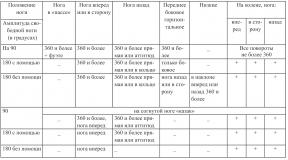6 days. What should be the standard hours for a six-day work week? What does the Labor Code of the Russian Federation say about non-working days?
This year, Russians will rest for eight days during the May holidays. However, such a schedule is provided only for employees of organizations working a five-day week.
Rest during the May holidays 2020 with a six-day working week includes only five days off. Let's talk about this in more detail.
The project for postponing holidays and weekends in 2020 has been approved, so you can already plan your vacation this month.
How much rest do you have during the May holidays in a 6-day work week?
The first of May falls on a Friday this year. Then, with a six-day week, we have one working day on Saturday, May 2, then Sunday, May 3, after that, working Monday, May 4, and then a day off on Tuesday, May 5, moved from the holiday Sunday, January 5.
Rest days on May holidays 2020 with a six-day work week for employees of organizations working on such a schedule (as well as schoolchildren and students of higher educational institutions) do not include working Saturdays.
Consequently, Saturday May 2 and the day of rest on Monday May 4, which was moved from the New Year's holiday Saturday on January 4, in this case will not be days off.
How long will they have a total vacation for the May holidays 2020 with a 6-day working week? The next day off will be three working days later on May 9, which falls on a Saturday. The Victory Day weekend will continue on Sunday, May 10, but there will be no transfer of the day off from Saturday, May 9, to Monday, May 11, given the six-day period.
Thus, with a six-day workweek schedule, we will rest for a total of five full days on the May holidays.
According to current legislation, the duration of work on the eve of holidays in this mode cannot exceed five hours. In 2020, with a six-day period, the pre-holiday shortened days will be Thursday, April 30 and Friday, May 8.
So, let’s list the rest days for the May holidays in 2020 for a six-day work week: these are May 1, 3, 5, 9 and 10.
However, those who work on a duty schedule will need to work on holidays (this category includes firefighters, some medical workers, security guards, employees of the Ministry of Emergency Situations and other organizations).
Now you know how people relax on the May holidays with a 6-day work week in 2020, and you can plan the upcoming days of rest at your own discretion.
On Monday, May 11, a new working week will begin and there will be no holidays until the end of the month. In total, in May we will have two holidays, six days off and 23 working days (with a six-day week).
- Current labor legislation allows an employer (organization or individual entrepreneur) to establish several working week schedules for its employees:
✔ 5-day work week with two days off (usually Saturday and Sunday) lasting no more than 40 hours;
✔ 6-day work week with one day off (usually Sunday) lasting no more than 40 hours;
✔ working week with a rotating schedule of days off;
✔ part-time work.
The basis for establishing a 6-day working week
Establishing a six-day working week is possible legally.
A 6-day working week can be established for all employees of an organization or individual entrepreneur, as well as for certain categories or positions of employees in connection with a particular production need. Features of the work and rest regime of employees, including the length of the working week, are prescribed in the employer’s internal labor regulations.
For micro-enterprises, a 6-day working week is prescribed in employment contracts with each employee.
The need for a 6-day work week.
A six-day working week is most often established in shops, public catering outlets, medical institutions and educational institutions, and so on, i.e. in places primarily serving the population.
As a rule, service establishments work daily for 10-12 hours, i.e. beyond the normal working hours of the employee, because Current legislation establishes an 8-hour working day as the maximum length of a person's working time.
And although it is possible to involve employees in overtime work, such involvement is permissible only with the consent of the employee himself, subject to increased payment for overtime work at the rate of one and a half times the rate for the first two hours of overtime work and double the rate thereafter. At the same time, the duration of overtime work itself should not exceed 4 hours for two days in a row and 120 hours for the entire year.
The question is, how, in this case, can we ensure the daily operation of the enterprise for, say, 12 hours?
The optimal solution in this situation would be to organize shift work for workers for 6-7 hours a day during a 6-day work week.
With a 6-day work week, the length of the work week can be 40 hours, i.e. normal duration (7 hours for 5 days, on the day before a day off - 5 hours), and shortened duration (35-hour or 24-hour work week).


Features of a 6-day work week
Please note that during a six-day work week, on the eve of the weekend, the employee’s work hours should not exceed 5 hours.
If for some reason a day off on Sunday cannot be provided, then the employee has the right to choose any other day during the working week for rest. The duration of continuous weekly rest should not be less than 42 hours.
Some rules inherent in a five-day work week also apply to a six-day work week.
For example, with regard to vacations for employees with a six-day period, in this case it is calculated in the same way as for a five-day period. After all, the number of vacation days is not related to the number of hours worked and should be 28 days annually (unless the employees belong to the category of employees with extended vacations).
Reforming the education system affects almost all aspects of the lives of teachers and students, from the format of passing the Unified State Exam to the schedule according to which certain educational institutions operate. It's no secret that in Russia. As in many other countries, there are schools that operate on a 5-day schedule and schools that require attendance 6 days a week.
To be or not to be a six-day period? Psychologists, teachers and scientists have been working on this issue for many years, but this topic is even more actively discussed in parent circles. Let's face it, not all parents like the prospect of getting up early on their legal day off to get their child ready for school, and even the need to adjust their personal plans taking into account the work of the educational institution.
So what awaits us regarding the five-day school year 2018-2019? Let's figure it out.
Will the six-day week be canceled in the near future?
It is known that there are several petitions that have collected a large number of signatures asking for a revision of the 6-day school schedule. But even in the 2019 academic year, the work schedule of each individual school, whether it will be five days or six days, will be decided directly by the management of the educational institution.
It seems to many that the ministry simply stubbornly refuses to satisfy the demands of parents who have come out to fight for an additional day off for schoolchildren.
But is it? Is it really possible to take one order and cancel working Saturdays for children and teachers forever? To understand the complexity of this problem, persistent parents would do well to study the legislation and curriculum better.
Why does the six-day period exist?
The need to use Saturday in most cases is dictated by the fact that even with a great desire, it is impossible to distribute educational subjects for students in grades 6-11 over 5 school days, if we take into account all the existing coefficients and sanitary requirements for the subjects.
Without delving into the intricacies of drawing up a schedule for a large educational institution, I will give the following standards as an example:
- mathematics, physics, languages and some other disciplines should not be assigned to the first and last lessons;
- objects on which the child’s perseverance is especially important should not be placed after physical education;
- Schoolchildren cannot be overloaded on one day (there are certain coefficients, the table of which is used by head teachers when drawing up schedules);
- Subject teachers should not read more than 3 lessons in a row (this norm, of course, is often violated in our country);
- subjects studied more than once a week should be placed at a certain interval.

This is only a small fraction of the existing restrictions. Add to this the division of classes into 2 (and sometimes 3-4) subgroups and you get an unsolvable problem. And this is not an exaggeration. Most automated scheduling services will really fail and ask which of the “important ministerial rules” can be ignored.
Pros of a six-day school week
- properly distributed teaching load;
- fewer lessons per day;
- less homework, day after day;
- more opportunities for children to attend clubs and sections;
- the opportunity to start the working day a little later than 5-day schools.
Disadvantages of a six-day week
- a persistent negative attitude towards learning on the Sabbath;
- absenteeism from classes without good reason and often with the knowledge of parents;
- conflict with the beliefs of some religions, where working and even studying on the Sabbath is considered unacceptable;
- Holidays that fall on Saturday are not postponed, as for organizations with a five-day work week.
Myths about the six-day period
Is the 6th working day so terrible for a schoolchild?
In fact, not everything is so sad. The vast majority of educational institutions adhere to the following rules:

The right to choose
This problem is not typical for all schools. As a rule, it does not fit into the five-day schedule in gymnasiums, lyceums and specialized schools with in-depth study of certain subjects.
As a result, parents have to choose between the following options:
- A regular comprehensive school, in which the child will study for 5 days, but study all subjects at the “standard” level;
- A specialized school or gymnasium with a 5-day period, where the child will have to sit through 8 lessons every day (and accordingly prepare homework);
- An educational institution with in-depth study of certain subjects, in which the child will have 6-7 lessons a day, but 6 days a week.

You can and should find out what schedule awaits your child in the future at the stage of choosing a school. If high-quality competitive education is a priority, then the problem of working Saturday is not as pressing as the quality of the teaching staff and the conditions in which the child will study.
Of course, a new question arises - is it possible, by adding hours for specialized subjects in specialized schools, to reduce the hours for disciplines that children who have decided on a profile will definitely not need? But this is a completely different topic that requires a revision of the list of subjects in the variable and invariable components of domestic education.
Why do you need a production calendar for 2018 with a six-day working week? How many working days are there in 2018 with a six-day week? What is the standard working time in this mode of operation in 2018? You can view the production calendar in this article.
General information about the production calendar
There are 365 calendar days in 2018. However, there are quite a few holidays in Russia. They also include weekends (with a six-day work week - Sunday). How not to get confused and correctly distribute working time norms during the “six-day work week”? Moreover, if we are talking about accounting, then working days, holidays and weekends must be taken into account when calculating vacation pay, travel allowances and when preparing reports. For this purpose, the production calendar for 2018 is being formed with a six-day working week.
Making a calendar for 2018
Article 112 of the Labor Code of the Russian Federation defines non-working holidays, and the Decree of the Government of the Russian Federation of October 14, 2017 No. 1250 “On the transfer of holidays in 2018”. These regulatory legal acts are the basis for the formation of the production calendar for 2018 with weekends and holidays.
What does the Labor Code of the Russian Federation say about non-working days?
Non-working holidays in the Russian Federation are:
- January 1, 2, 3, 4, 5, 6 and 8 – New Year;
- January 7 – Christmas;
- February 23 – Defender of the Fatherland Day;
- March 8 – International Women's Day;
- May 1 – Spring and Labor Day;
- May 9 – Victory Day;
- June 12 – Russia Day;
- November 4 is National Unity Day.
This list of non-working holidays is fixed and does not change from year to year. It is enshrined in Article 112 of the Labor Code of the Russian Federation.
What transfers to 2018 do not apply to the six-day period?
Article 112 of the Labor Code of the Russian Federation provides that the transfer of days off is carried out for the purpose of rational planning of working time in organizations and taking into account the interests of various categories of citizens of the Russian Federation in creating conditions for proper rest. For these purposes, Decree of the Government of the Russian Federation of October 14, 2017 No. 1250 “On the transfer of weekends in 2018” provides for the following shift of weekends:
Read also KBK 18210301000011000110: transcript in 2019
Thus, the following weekends have been moved to 2018:
- Saturday 6 January to Friday 9 March;
- Sunday 7 January to Wednesday 2 May.
- Also, to optimize rest time, weekends have been swapped with working days (Saturdays will be working days, and Mondays will be days off):
- Saturday 28 April to Monday 30 April;
- Saturday 9 June to Monday 11 June;
- Saturday 29 December to Monday 31 December.
In a six-day work week, Saturdays are not days off, which means that these transfers are not provided for a six-day work week.
For those working on a six-day week, March 9, April 30, June 11 and December 31, 2018 will remain working days, since the transfer of days off to these dates is planned from Saturdays that coincide with non-working holidays, and for the “six-day week” Saturday is not a day off.
Due to the postponement of January 7 to May 2, workers with a six-day working week in 2018 will have two consecutive days off for the May holidays - May 1 - 2.
Shortened working days with a reduction in working hours by one hour in 2018 for six-day workers will be February 22, March 7, April 30, May 8, June 11, November 3, December 31.
Production calendar for 2018 with a six-day week
Here is the production calendar for 2018 with a six-day working week:

Below we present a quarterly production calendar for a six-day work week (with weekends and holidays). Taking into account all the transfers, the production calendar for a six-day working week will look like this (pre-holiday days, when the working day is reduced by 1 hour, are marked with an asterisk *).
What does the Labor Code of the Russian Federation say about non-working days? Non-working holidays in the Russian Federation are:
- January 1, 2, 3, 4, 5, 6 and 8 – New Year;
- January 7 – Christmas;
- February 23 – Defender of the Fatherland Day;
- March 8 – International Women's Day;
- May 1 – Spring and Labor Day;
- May 9 – Victory Day;
- June 12 – Russia Day;
- November 4 is National Unity Day.
This list of non-working holidays is fixed and does not change from year to year. It is enshrined in Article 112 of the Labor Code of the Russian Federation. What transfers in 2018 do not apply to the “six-day week” Article 112 of the Labor Code of the Russian Federation provides that the transfer of days off is carried out for the purpose of rational planning of working time in organizations and taking into account the interests of various categories of citizens of the Russian Federation in creating conditions for proper rest.
Online magazine for accountants
Attention
TOP 13 mistakes of entrepreneurs in LLCs and individual entrepreneurs This article needs regular updates How to select for tax audits: pre-audit analysis kitchen There was a chance to start changing something. But 76 say, we’re already fine, we have hypersound, but we don’t need any more...
Info
International passports and driver's licenses will become more expensive. Another question: “How much is left?” Today there are two fewer banks in Russia Anonymous from Cheboksary, I support you! Editorial There is so much water, you can write briefly: 1. Take cards denominated in dollars or euros with you...
"Personal Accounting". How best to pay when traveling around Europe: personal experience If there is no real estate taxed at cadastral value Calculation of property tax for the 1st quarter: reflecting movable property in a new way Not paid. Calculation of property tax for the 1st quarter: reflecting movable property in a new way Anonymous, you wrote: Clouds are cheaper, that’s a fact.
Production calendar for 2018 with a six-day work week
For those working on a six-day week, March 9, April 30, June 11 and December 31, 2018 will remain working days, since the transfer of days off to these dates is planned from Saturdays that coincide with non-working holidays, and for the “six-day week” Saturday is not a day off. The “New Year holidays” for those working on a “six-day week” will last from January 1 to January 8, 2018. Due to the postponement of January 7 to May 2, workers with a six-day working week in 2018 will have two consecutive days off for the May holidays - May 1 - 2.
Shortened working days with a reduction in working hours by one hour in 2018 for six-day workers will be February 22, March 7, April 30, May 8, June 11, November 3, December 31.
The same applies to those who work a “six-day shift”, and all hours that the employee worked above the norm must be paid at an increased rate, even if such schedule features were specified in advance in the employment contract. Below we will consider the situation when the employer is obliged to make additional payments for overtime work: Nikanorova S.I.
works in an organization where the work schedule is 6 days a week, day off is Sunday. Her working day lasts from 09:00. 00 min. until 5 p.m. 00 min. On Saturdays she works from 10 o'clock. 00 min. until 2 p.m.
00 min. Thus, she completes her weekly hours (40 hours) on Friday. Her work hours on Saturday are considered overtime, despite the fact that the organization’s local documents indicate the working hours.
In accordance with the Labor Code of the Russian Federation, she should be paid monthly additional payments for work above the norm, but the manager does not do this.
Vacation pay calculator in 2018
The normal working hours for a six-day working week, as well as for a five-day one, cannot exceed 40 hours per week (Article 91 of the Labor Code of the Russian Federation). For a six-day working week in accordance with the Procedure, approved. By Order of the Ministry of Health and Social Development of Russia dated August 13, 2009 N 588n, the standard working time is also calculated according to the calculated schedule of a five-day work week with two days off on Saturday and Sunday, based on the duration of daily work (shift). In accordance with Part 1 of Article 95 of the Labor Code of the Russian Federation, the duration of the working day or shift immediately preceding a non-working holiday is reduced by one hour. With a 6-day working week on the eve of the weekend, the duration of work cannot exceed 5 hours (part three of Article 95 of the Labor Code of the Russian Federation). The standard working time calculated in the specified order applies to all work and rest regimes.
Production calendar 2018 with a six-day work week
Important
Regarding the reliability of the data - I’m not strong in these terms... Modern online cash register - an assistant for business Do you not pay property tax under the simplified tax system of 15%? Calculation of property tax for the 1st quarter: reflecting movable property in a new way Good luck! I hope common sense will prevail. Moscow tax authorities ignore the movable property benefit introduced by the Moscow Nad.K law, here I completely agree.
If the price of the issue had been, well, even 100 thousand, I would not have bothered... Individual entrepreneurs on OSNO consider the procedure for accounting for losses and the cash method of accounting for income to be unfair. The main thing is that if a company or individual entrepreneur does not operate, but there are debts, in what sense is this? Who and where...
Pay off your tax debts by May 1st. Otherwise, counterparties will find out about them. Anonymous, haven’t you even read what’s written?)) In the review they just write that these are the schemes...
Tax Code of the Russian Federation) personal income tax on vacation pay On the date of payment of personal income tax/contributions to the budget (clauses 6, 7 clause 1 of article 346.16, clause 3 clause 2 of article 346.17 of the Tax Code of the Russian Federation, Letter of the Ministry of Finance of Russia dated 02/05/2016 N 03-11 -06/2/5872) Insurance premiums accrued from the amount of vacation pay “Income” simplifiers have the right to reduce tax (advances) under the simplified tax system by the amount of contributions accrued from vacation pay in the period in which the contributions are transferred to the budget (clause 1, clause. 3.1 Article 346.21 of the Tax Code of the Russian Federation). Compensation for unused vacation If a resigning employee has unused vacation, then the employer must pay him upon dismissal compensation for unused vacation (Article 127 of the Labor Code of the Russian Federation).
Nikanorova S.I. appealed to the Trade Union with a complaint about the lack of additional payments, and after an inspection, the body determined that the actions of the manager Nikanorova S.I. are illegal. Thus, all hours exceeding the weekly norm (40 hours) are overtime and are subject to mandatory compensation at a higher rate than scheduled work time on weekdays. What regulatory documents and laws should employees working on a six-day week and employers planning to establish such a schedule be guided by:
- “Production calendar for 2017”;
- Art. 100 of the Labor Code of the Russian Federation on working hours;
- Art. 91 of the Labor Code of the Russian Federation on normal working hours;
- Art. 111 of the Labor Code of the Russian Federation on days off;
They also include weekends (with a six-day work week - Sunday). How not to get confused and correctly distribute working time norms during the “six-day work week”? Moreover, if we are talking about accounting, then working days, holidays and weekends must be taken into account when calculating vacation pay, travel allowances and when preparing reports.
For this purpose, the production calendar for 2018 is being formed with a six-day working week. Drawing up a calendar for 2018 Article 112 of the Labor Code of the Russian Federation defines non-working holidays, and Decree of the Government of the Russian Federation of October 14, 2017 No. 1250 “On the transfer of weekends in 2018”. These regulatory legal acts are the basis for the formation of the production calendar for 2018 with weekends and holidays.
The Labor Code of the Russian Federation on overtime work. Is it possible to establish a six-day work week with one day off and how to do this? The legislation does not make any prohibitions regarding the formation of work schedules in organizations: managers can establish both five-day or shift work schedules, as well as irregular work schedules. However, it should be remembered that, regardless of the schedule, there is only one standard working hours per week - 40 hours.
The rest of the time worked on weekends is paid at double the rate. To prevent errors in calculations, each company must keep a time sheet, which will indicate all employees and the days on which they worked or rested. At the end of the reporting period, this document is submitted to the accounting department, and on the basis of it, wages are calculated for each employee.
Why do you need a production calendar for 2018 with a six-day working week? How many working days are there in 2018 with a six-day week? What is the standard working time in this mode of operation in 2018? You can view the production calendar in this article. Subscribe to the accounting channel in Yandex-Zen!
- 1 General information about the production calendar
- 2 Drawing up a calendar for 2018
- 3 What does the Labor Code of the Russian Federation say about non-working days?
- 4 Which transfers to 2018 do not apply to the six-day period?
- 5 Production calendar for 2018 with a “six-day week”
- 6 Standards of working time for a “six-day workday”
- 7 Number of days in 2018 for a six-day work week (quarterly)
General information about the production calendar There are 365 calendar days in 2018. However, there are quite a few holidays in Russia.
What needs to be done from May 3 to 4 The first working week of May will last only two days. Many people even prefer to extend their personal May holidays through vacations and time off. Whether you're planning to go back to work next week or want to take a spring break break, check out our weekly accounting reminders. This will make it easier for you to plan your work for the coming days and provide valuable instructions to your colleagues.< < … Зарплата за апрель: не ошибитесь в дате перечисления НДФЛ из-за майских праздников В нынешнем году первая «порция» майских праздников будет длиться 4 дня (с 29 апреля по 2 мая включительно). Если в вашей компании день выплаты зарплаты – 1-е или 2-е число, выдать апрельскую зарплату придется досрочно – 28 апреля. В этот же день нужно удержать и зарплатный НДФЛ. < …



















